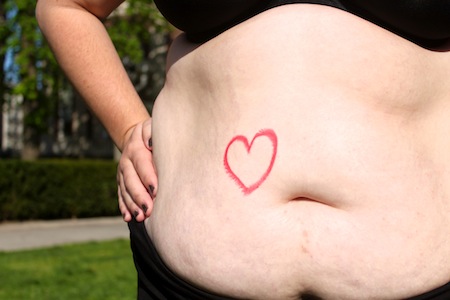In response to Kerry Cohen’s “I’m Not Fat, But What If I Were?” piece on Role/Reboot last week, Jenn Leyva refutes the myths about the fat body, and shares how she came to accept—and even love—herself the way she is.
Last week, Kerry Cohen wrote a piece about what it would be like if she were fat. What I gleaned from Kerry’s article is not a representation of the lives of fatties, but rather a case of “at least I’m not as fat as her.” The rules of the game are simple. In order to loathe your body less, you find someone fatter and uglier than you, and then you can be content knowing that even though your body is obviously a disgusting wreck not worthy of love, it could be a lot worse. You could be THAT FAT. The premise of the game is that negative feelings about her body are proportional to body size.
I feel frustrated when I read these types of “what if I were fat” articles because there are plenty of fat people strolling about the world happy to tell you what it’s like. We walk among you—you might even know us!—and yet there are still specials with celebrity talk show hosts dressing up in fat suits to tell me what it’s like to be fat. (Because all fat people are actually thin people temporarily trapped in a fat body.) So, to set the record straight, I, an expert fatass, will tell you what it’s like to be fat. (It must be noted that fat is not a monolith; my experiences are shared by many, but are not universal.)
There are actual, physical, institutional problems that fatties face. As I’ve written about here before, chairs don’t fit. Clothes are hard to find, and are all too often both ugly and expensive. There’s open employment discrimination, and fatties are paid significantly less. Depictions of our bodies are limited to montages of headless fatties while newscasters profess the dangers of the Fat Rampage or sad fatties in the before picture in a diet ad. Physicians refuse to treat our illnesses and regularly mistreat and abuse us when they do decide to treat us.
There are also terrible pervasive myths about the fat body. One is that fat acts as a repellent for male attention. Male attention is not a unit of measure for my value as a woman and my beauty. Even so, my fat body does not repel men. I know I’m not everyone’s cup of tea, but if it were my prerogative, I could get laid tonight before my dinner is delivered. Branching off of that idea is the idea that the fat body is unlovable. No fat person could possibly love or even accept their body. I mean, it’s just so fat! We are all trained to loathe our bodies—I’d argue that it’s part of the capitalist scheme to trick us into buying more useless products, but that’s another essay.
Another myth is the idea that self-acceptance is impossible. This is a myth. It’s not true. The premise of the “At Least I’m Not As Fat” game is faulty. Not all fatties hate their bodies. This is important, so I’ll say it again: Self-acceptance is possible. It does not come out of thin air—empty affirmations will not get you there. A loving relationship with your body, like any meaningful relationship, can only be built brick by brick.
I have been lucky to find wonderfully brilliant, kind, and generous fat people who have helped me to develop the tools necessary to build a loving relationship with my body. These fatties have had enough. They have taken to cultivating a critical resistance to the cultural norms. It is this critical resistance that has challenged my relationship with my body and allowed for self acceptance and sometimes even love. Margitte Kristjansson taught me that I don’t have to explain my fat to anyone. Tasha Fierce taught me how to see that my fat body is sexy. Michelle taught me how to eat—not how to diet or how to eat with the intent of changing my body, just eating. Food. Lesley Kinzel taught me to not step on a scale. Hanne Blank taught me to negotiate boundaries with my physicians.
Through the testimonies of my fellow fatasses and a thoughtful introspection about the lived realities of my life, I have found peace. I accept and sometimes even love my fat body because I see through the lies and deception of diet culture.
My fat body brought me to self-acceptance. That’s more than many thin people can say.
When Jenn Leyva was 16, her dad told her that he’d buy her a car if she lost weight. She cried, finished her calculus homework, and is now a New York based fat activist and a senior at Columbia studying biochemistry. She authors Fat and the Ivy, a fat blog about social justice, feminism, science, health, and fa(t)shion.
Photo by Mason Fitch
Related Links:

